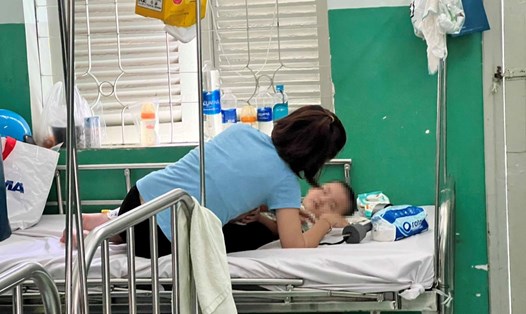The first case is a 5-day-old boy in Hanoi. The baby's mother discovered she had chickenpox on the third day after birth and immediately isolated herself from her baby. However, on the 5th day after birth, the baby began to show symptoms of chickenpox such as rashes and blisters all over the body. Luckily, the baby's condition is good because he is feeding normally and there are no complications.
Currently, the baby's rashes are almost gone and no new rashes appear.
The second case is a 2-month-old boy in Hanoi. 3 days after admission to the hospital, blisters began to appear spreading all over the face and body, accompanied by coughing and wheezing. The rash grows in abundance and spreads quickly and densely. The baby's fever reached 38 degrees and was taken to the hospital by family members. When admitted to the hospital, the baby had pneumonia, accompanied by a multi-form, multi-age rash all over the body. The baby was given antibiotics and antiviral drugs, aerosols.
Currently, the baby's old rashes have shrunk, no new rashes have appeared and the bronchopneumonia condition has stabilized.
Doctor Le Thu Trang, Department of Pediatrics, Central Tropical Diseases Hospital, said that Chickenpox is an infectious disease that causes epidemics. The disease is transmitted through the respiratory tract. Clinically, the disease manifests as fever, blistering rash of various ages on the skin, and itchy rash.
Most diseases usually have a benign course, however there can be some complications such as superinfectious dermatitis, encephalitis, pneumonia, myocarditis, nephritis, arthritis and often occur in special locations. such as immunocompromised people (people with cancer, chemotherapy treatment, immunosuppressive drugs), infants, young children, and people with chronic diseases.
The normal incubation period of chickenpox averages 10-14 days. Chickenpox will spread to people around while the patient still has rashes. Newborns with chickenpox in the family need to be hospitalized early for timely monitoring and treatment to avoid dangerous complications that can affect the child's life such as hepatitis, pneumonia or encephalitis due to resistance. of children is still weak.
Doctor Trang recommends: When discovering that a child in infancy has chickenpox, parents should take their child for early examination at a medical facility, and should not self-treat at home. If the mother gets chickenpox while breastfeeding, she needs to clean her hands regularly and wear a mask to avoid bacteria being transmitted directly through droplets (talking, coughing, sneezing) or fluids. secretions from blisters).
In particular, when discovering that a child < 6 months old has chickenpox, parents should take the child to the nearest medical facility so that the child can receive antiviral medication within the golden hour of the first 24 to 48 hours. If antiviral drugs are used later than 24-48 hours, the child's rash is susceptible to more severe and more serious complications.
Chickenpox vaccination is the most effective and long-lasting way to prevent chickenpox.








